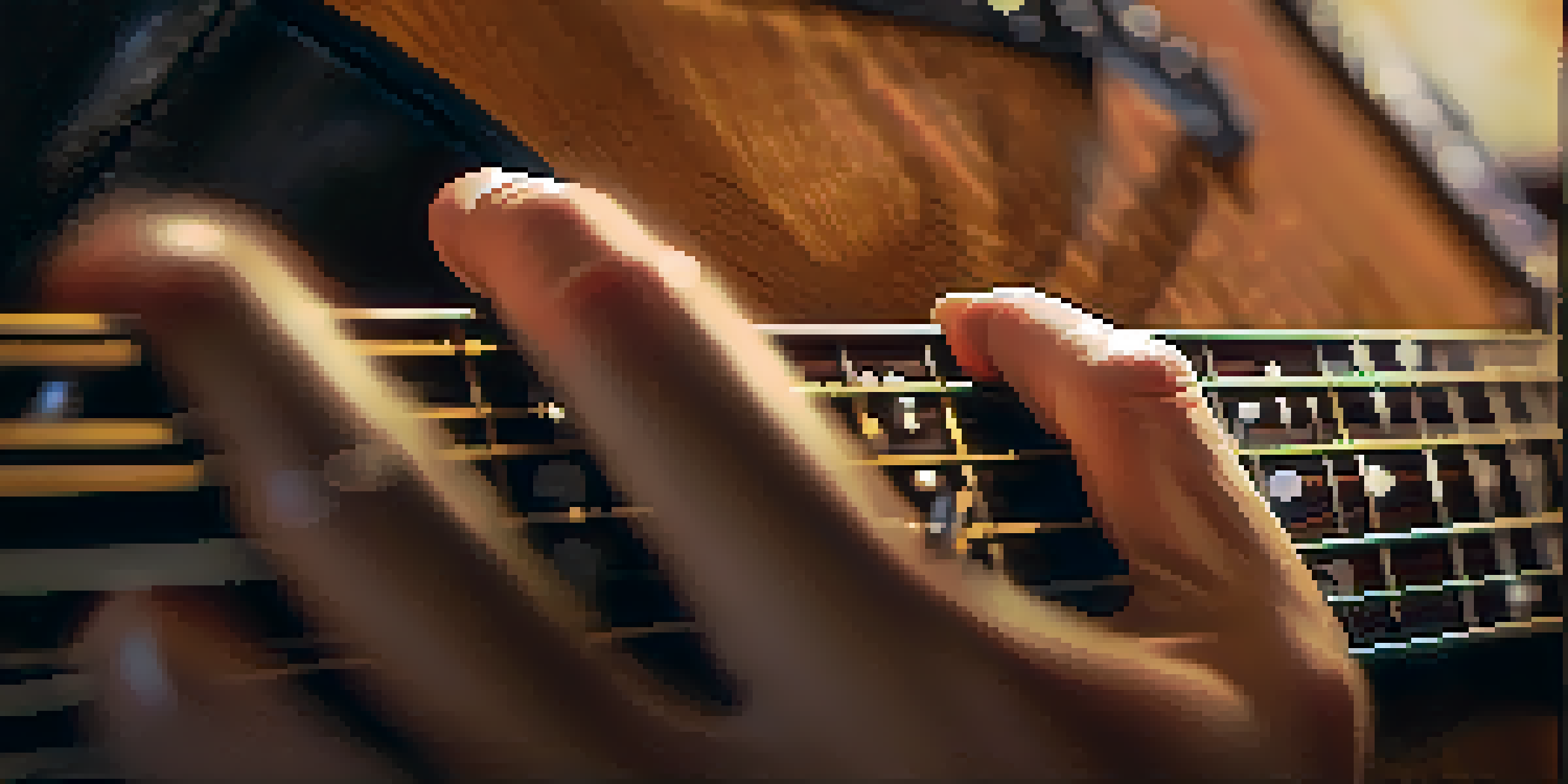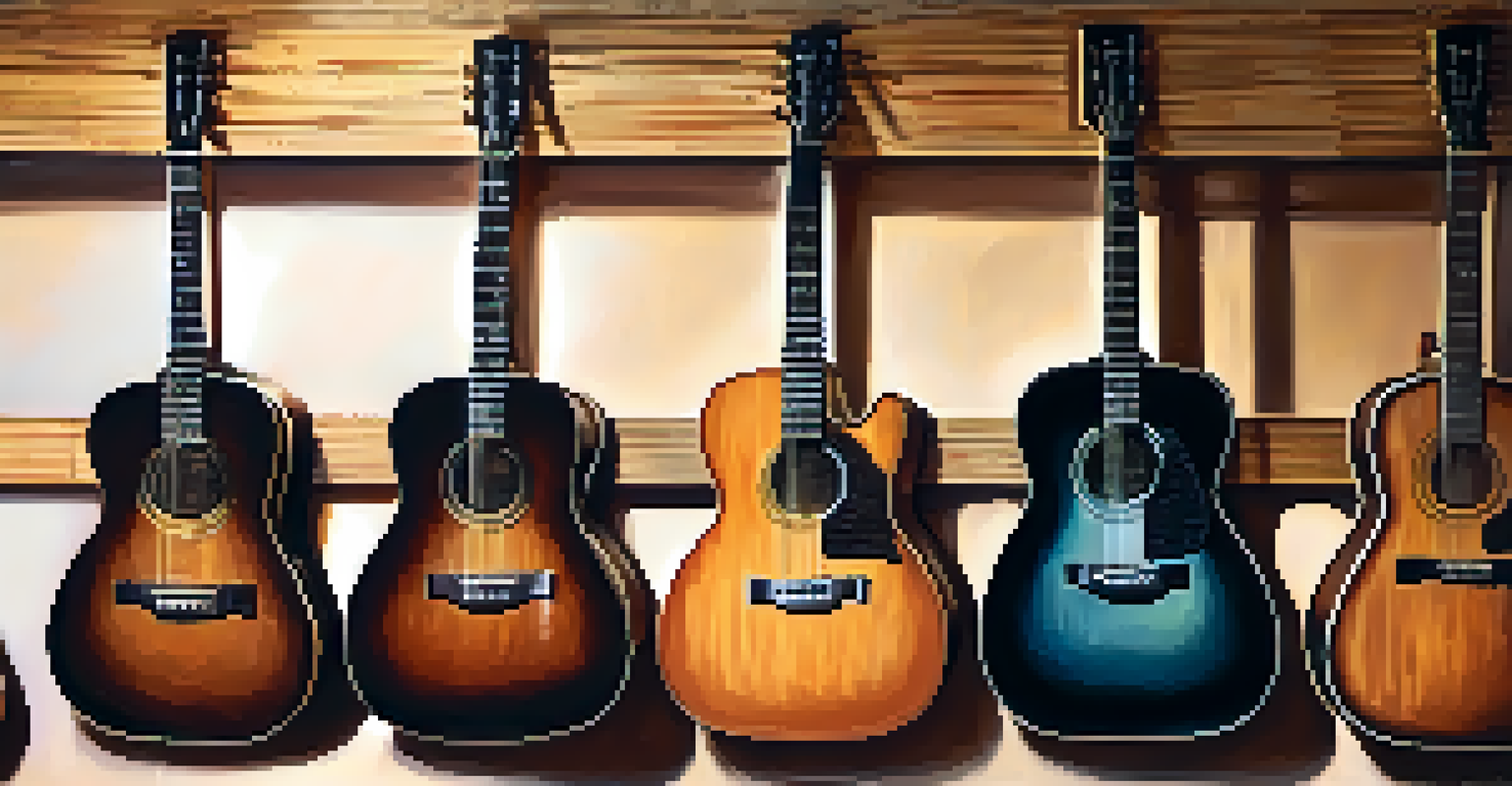Do You Need Expensive Gear to Play Guitar? The Truth Revealed

Understanding the Basics: Gear vs. Skill
When starting your guitar journey, it's crucial to recognize that your skills matter more than your gear. Many beginners believe that purchasing the latest, high-end instrument will magically improve their playing. However, it's often practice and dedication that lead to real progress, not the price tag on your guitar.
It's not about the guitar you have, but how you play it.
Consider this: a talented musician can create beautiful music on a budget instrument, while an expensive guitar in the hands of a novice may not sound any better. This highlights the importance of focusing on technique and learning rather than getting caught up in the allure of fancy equipment.
Ultimately, finding joy in playing and developing your unique style should take precedence over what gear you own. As you grow as a guitarist, you can gradually invest in better equipment, but starting with what you have is perfectly fine.
The Myth of 'You Get What You Pay For'
It's a common belief that high-priced gear guarantees superior quality. While it's true that some expensive instruments are built with better materials, this isn't a universal rule. Many budget-friendly guitars can produce impressive sounds and hold up well over time, especially for beginners.

Take, for example, brands that offer excellent entry-level guitars without breaking the bank. These models often provide great playability and sound, making them perfect for those just starting. The key lies in doing your research to find the best options within your budget.
Skills Over Gear: Focus on Practice
Your musical progress hinges more on practice and dedication than on owning expensive instruments.
Moreover, the most expensive gear isn't always necessary for casual players or those just exploring their passion. Understanding your needs and what makes you comfortable can guide your purchasing decisions more effectively than price alone.
The Importance of Comfort and Playability
One of the most important factors in choosing a guitar is how it feels in your hands. A comfortable instrument can inspire you to practice more often and build your skills. If you're struggling to play a guitar because of its weight or action (the height of the strings from the fretboard), then even the priciest model won't serve you well.
The best instrument is the one you have in your hands.
Every player's preferences are different, so what works for one person might not work for another. For instance, some guitarists prefer a lighter body, while others might enjoy the fuller sound of a heavier instrument. Trying out various guitars at a local shop can help you find the right fit without spending a fortune.
Ultimately, investing in a guitar that feels good to you is more important than its price. A comfortable instrument will encourage you to play more, leading to better skills over time.
Exploring Budget Options and Brands
There are numerous budget-friendly brands that offer great guitars for beginners. Brands like Squier, Yamaha, and Epiphone produce quality instruments at accessible prices. These guitars often provide excellent sound and playability, allowing new players to focus on learning without financial strain.
Additionally, many of these brands have models that are highly regarded in the music community. This means you can find great value without sacrificing quality. A little research can go a long way in discovering which budget options align with your preferences.
Comfort Matters in Choosing a Guitar
Selecting a guitar that feels comfortable to play is crucial for inspiring more practice and skill development.
As you gain experience, you might find yourself gravitating toward more premium gear, but starting with a reliable budget guitar can set a solid foundation for your musical journey.
The Role of Accessories: Don't Overlook Them
While the guitar itself is essential, accessories play a significant role in your overall experience. Items like picks, straps, and tuners can enhance your playing and comfort. A good-quality strap, for instance, can make standing while playing much more enjoyable, especially during long practice sessions.
Investing a bit in accessories can also help you get the most out of your guitar. For example, a decent set of strings can vastly improve your instrument's sound without costing a fortune. These small investments can make a big difference in your playing experience.
Don't underestimate the impact of these tools; they can elevate your skills and make practice feel like less of a chore. Knowing how to care for and use your accessories effectively is just as important as the guitar itself.
The Beauty of Used Gear: A Hidden Gem
Exploring the world of used gear can yield fantastic finds at a fraction of the cost. Many musicians upgrade their equipment, leaving perfectly good guitars available for purchase. Shopping at local music stores or online marketplaces can help you discover these hidden gems.
When buying used, it's essential to inspect the guitar carefully. Look for signs of wear, such as fret wear or body damage, and don't hesitate to ask questions about its history. If possible, play the guitar before buying to ensure it meets your expectations.
Explore Budget and Used Options
Affordable brands and used gear can provide great quality and value without straining your finances.
Buying used gear not only saves money but also allows you to participate in the community of musicians who appreciate quality instruments. Many players are happy to pass on their beloved guitars, providing you an opportunity to own a unique piece of musical history.
Conclusion: Gear Is Just a Tool, Not the Goal
Ultimately, it's essential to remember that the gear you use is just a tool to help you express your creativity. While quality instruments can enhance your sound, they don't define your musical journey. Your passion, dedication, and willingness to learn are what truly matter.
Focus on building your skills, experimenting with different styles, and enjoying the process of making music. The right gear will come to you as you grow, and it's okay to start with something simple and budget-friendly.

So, whether you're eyeing a high-end guitar or a modestly priced model, keep your priorities in check. The real magic happens when you pick up your guitar and start playing, regardless of the price tag attached.